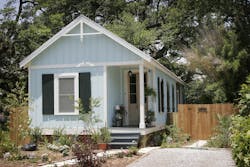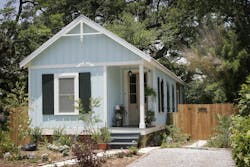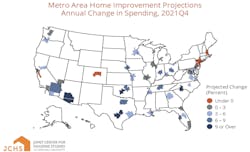Electricians Could Reap Benefits from Expected Remodeling Resurgence
After a year of COVID-19 lockdown, more Americans are on the verge of venturing out of their homes. But it looks like many have grown more attached to them — to the point that 2021 could be a big year for homeowners plowing cash into feathering their nests. And that translates to more business for electricians and electrical contractors working in that space.
Harvard University’s Joint Center for Housing Studies recently came out with new research forecasting solid growth in home improvement spending across the country this year. Total spending could increase between 1% and 13% over 2021 in 42 metro areas surveyed, says the report, with the highest concentration of activity sprouting in the nation’s Sunbelt region. Add it all up, and remodeling/addition work could increase 5% nationally by year’s end — more than double the estimated growth rate for 2020.
Other data show the growth trend might have begun in 2020, linked to pandemic-related sheltering. A survey released in January by Axiom Marketing on COVID-19’s impact on home improvement found 37% of those expecting to work from home this year plan on spending more time on home improvement projects. To get those projects done, 56% of respondents said they’ll seek the help of a contractor. Houzz, Inc., a web-based home renovation and design referral service, reported a 58% increase in project leads for renovation professionals last June. Additionally, inquiries about home additions and extensions were up 52%, suggestive of surging interest in more and improved living space to accommodate more people under one roof or more time spent in the home.
One solution drawing more interest is accessory dwelling units (ADUs). These free-standing structures, built on properties occupied by a single-family residence, are catching on, especially in densely populated metro areas where affordable housing and land to build on is at a premium. ADUs can be a solution to growth in multi-generation familial living arrangements — accommodating elderly parents or adult children in a residence — that have surged during the pandemic.
Unlike typical contiguous house additions, ADU projects demand building skills that are likely outside the scope of standard remodeling contractors, including electrical infrastructure design and construction. Early on, prospective ADU owners must determine how the dwelling will be powered, and several factors can come into play when evaluating options. Depending on locale (California, for instance, requires newly built, detached ADUs to be solar powered and some cities in the state are moving on all-electric construction mandates), builders must make sure to comply with specific regulations addressing electrical hookups.
For example, in San Jose, Calif., detached ADUs must be all-electric, have an installed solar PV system, and often need more robust 400A service panels in the primary residence — standards that don’t seem to be thwarting demand. Permit issuance spiked in 2019, with more than 400 issued, backed off some in 2020, but is off to a strong start in 2021, says City Spokesperson Cheryl Wessling.
“We received 76 ADU permit applications in January, which puts 2021 off to a brisk start,” she says. “When state and local regulations loosened on where ADUs could be built, we saw a major increase in ADU permit applications. We saw the demand slightly diminish during the COVID epidemic in 2020, but it remained surprisingly robust, and we anticipate continued demand for ADUs.”
Many older ADUs built in the city have been found to have substandard electrical infrastructure likely installed by unqualified persons, Wessling says. Common deficiencies include a lack of minimum required circuits; improperly installed AFCI/GFCI devices; aging electrical equipment; removed or compromised bonding of metal piping; and lack of grounding electrodes, disconnects, and no access to branch-circuit overcurrent.
Such situations point to the opportunity for qualified electrical contractors to be involved in competent ADU design and construction, something some contractors in areas of strong ADU interest might be promoting. For instance, PC Electric, a Portland, Ore.-based contractor, devotes a page on its website to ADU electrical infrastructure considerations.
ADUs clearly amount to only a tiny part of the opportunity matrix for electrical contractors working in the residential market. But they’re a trend that bears watching, especially in light of what looks to be a very real push by homeowners to make their existing living spaces larger, better, and more versatile and accommodating.
Zind is a freelance writer based in Lees Summit, Mo. He can be reached at [email protected].
About the Author
Tom Zind
Freelance Writer
Zind is a freelance writer based in Lee’s Summit, Mo. He can be reached at [email protected].



